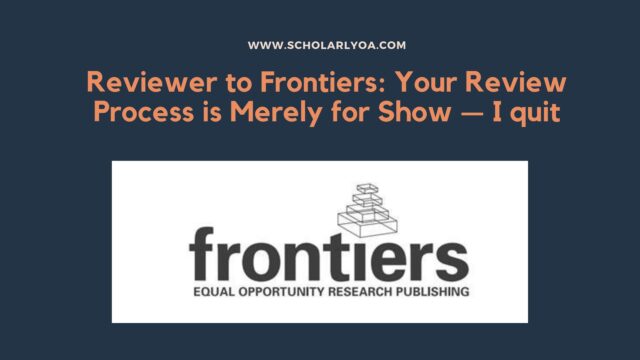
A senior researcher recently forwarded me a copy of an email he sent to the controversial Switzerland-based open-access publisher Frontiers. In the email, the researcher resigns as a Frontiers reviewer, citing fatal flaws in the publisher’s peer review process.
Here’s the email, anonymized at the sender’s request:
From: [Redacted]
Sent: [Redacted] 2016 [redacted]
To: ‘Frontiers in Psychology’ <psychology@frontiersin.org>
Subject: RE: Frontiers in Psychology
Hi Dr. Ashikali,
I have finished my final review for Frontiers. Please remove me from the so-called “Review” Board.
As someone who reviews for over 40 scientific journals, I would like to note that I have continued concerns about Frontiers’ status as a predatory journal/publication mill. For the final resubmission, I was waiting to review, the authors resubmitted without addressing any of the major concerns (basically saying see certain lines of text, which were actually word-for-word unchanged). The “review” process simply leads to low-quality work. Reviewers are bombarded with dozens of irrelevant review requests. In the event they agree to review, resubmissions commonly include letters that point to passages of text that have supposedly been “updated” but have not in actuality. Since reviewers are so overburdened with low-quality and irrelevant work from this journal, and because the rejection process is needlessly intricate (with numerous “are you sure” warnings), I suspect many non-updated or non-responsive resubmissions make it to publication. Essentially, this makes the “review” process merely for show. The incentive process supports low-quality reviews from reviewers, authors getting published, and Frontiers getting paid.
I will be forwarding a redacted version of this correspondence to Beall’s list. Please remove my name from your web site.
[Redacted]Frontiers is on my list, and I recommend against submitting papers to its many journals.
Frontiers have been on the attack against me for months, as documented in Leonid’s Schneider’s blog For Better Science.

The publisher has sent numerous emails to the President of the University of Colorado and other university officials demanding that they silence me. They’ve recruited some of their editors to send long, smarmy messages praising the “beauty” of Frontiers to university officials.
One of the commenters on Schneider’s blog post noted that COPE guidelines advise publishers to be polite and avoid being drawn into personal exchanges. Frontiers have attacked both me and Schneider in long exchanges, in apparent violation of the COPE guidelines.
However, Frontiers used its wealth to recruit and hire a COPE board member from another publisher, so the likelihood of any corrective action from COPE is remote.
If there were a listing of arrogant predatory open-access publishers, I think Frontiers would lead the list.












